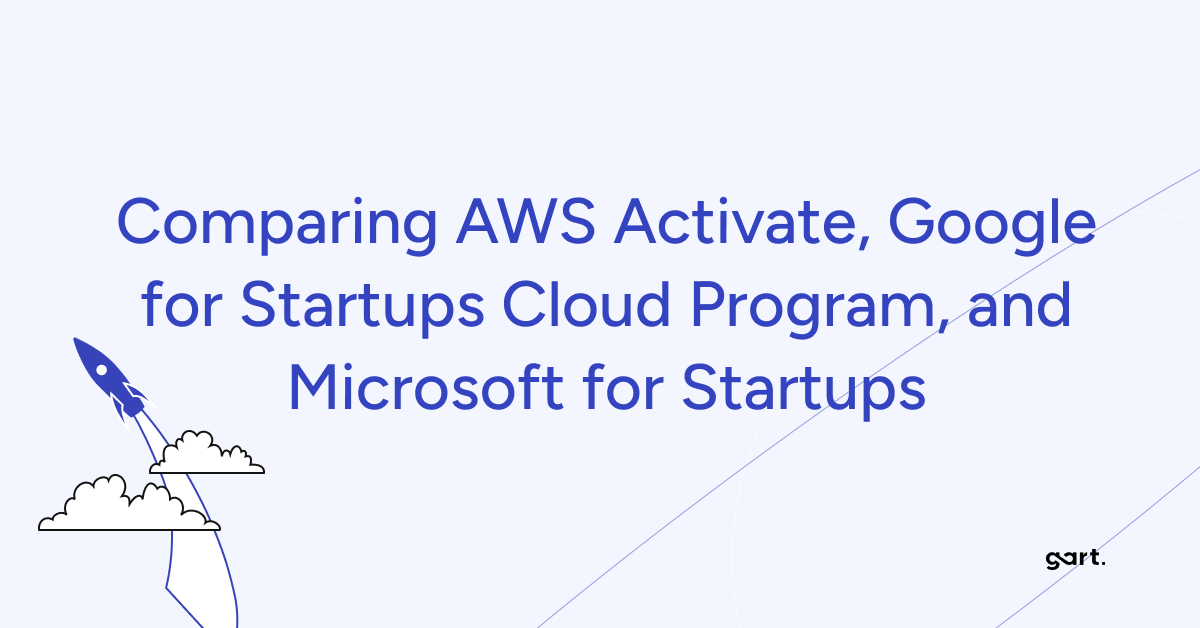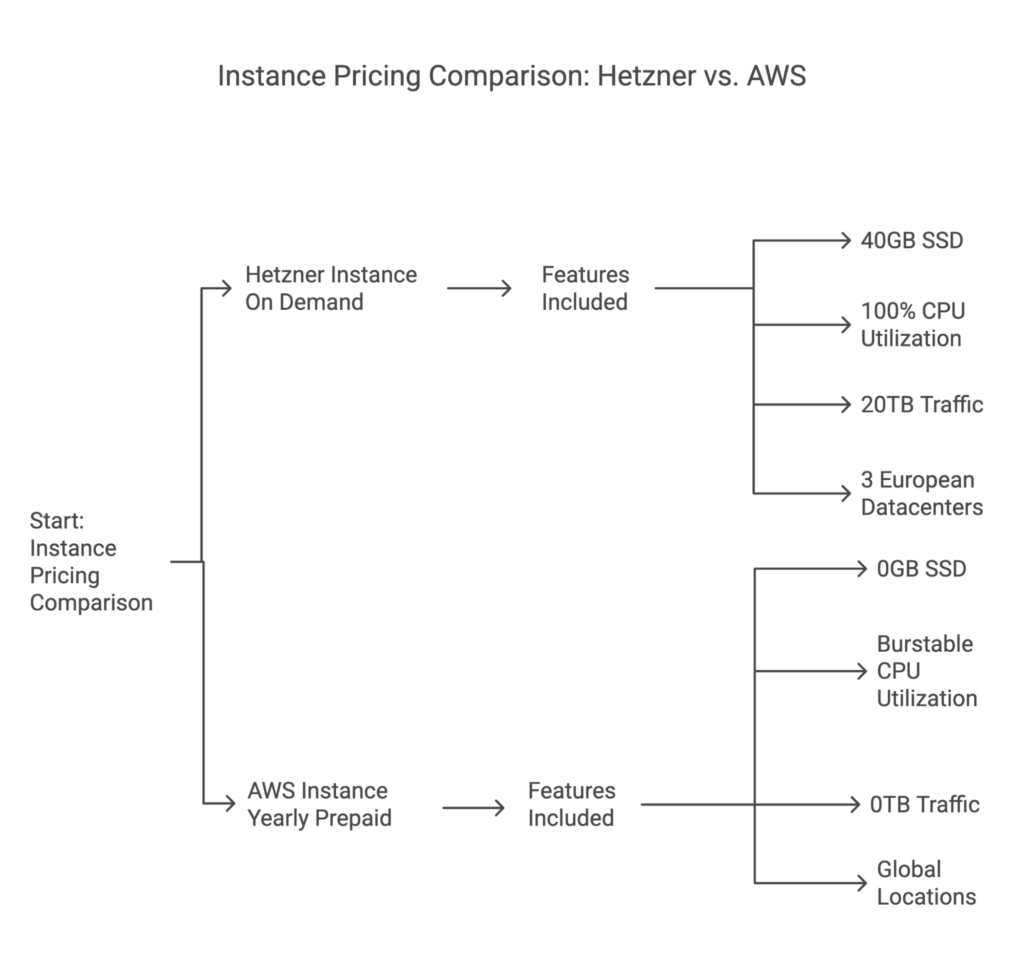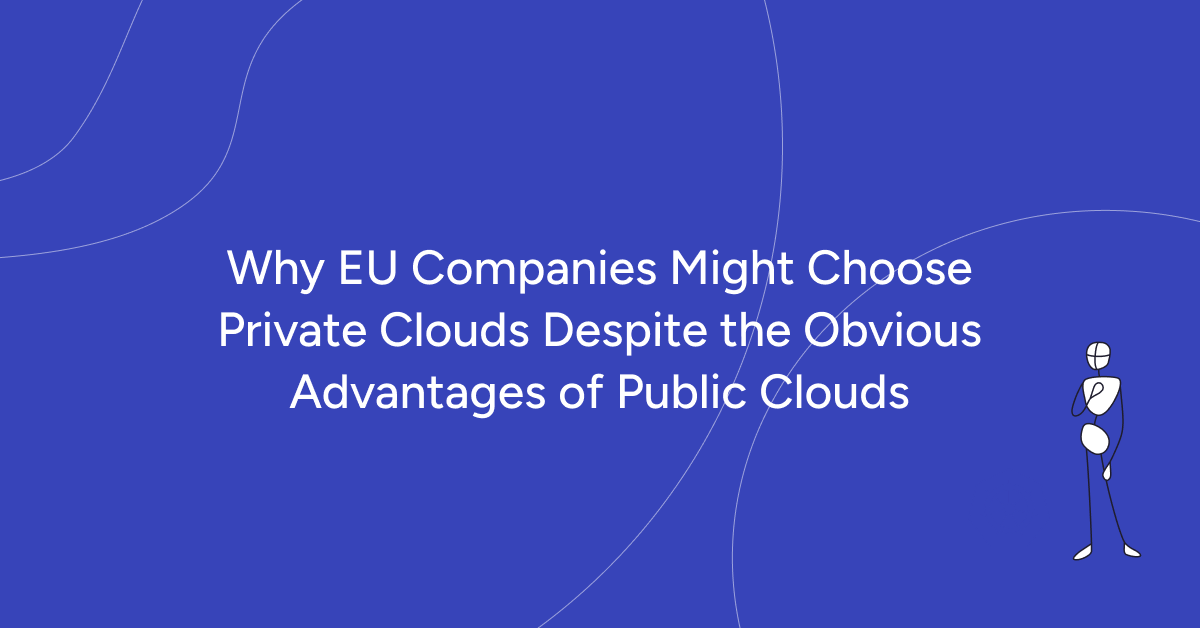
If you're launching a startup, you’ve probably wondered where to host your solution. It's essential to understand that an application consists of lines of code that must run on a server, allowing users to access it.
With traditional hosting, you purchase a server and deploy your application on it. In contrast, the cloud simplifies this process: you upload a ZIP file or a source code folder, and you don’t have to worry about crashes. The cloud ensures high reliability by automatically restarting your application if it crashes, eliminating the need for a 24/7 engineer.
Cloud providers offer managed services that simplify development, enhance scalability, and reduce the need for maintenance, allowing startups to focus on their core code and business needs.
But dependency on specific cloud provider technologies can create lock-in, making it difficult to migrate to other providers or infrastructure in the future.
Choosing the right cloud platform is a crucial decision for any startup, and the good news is, all the major players – AWS, Google Cloud Platform (GCP), and Microsoft Azure – offer generous startup programs to help you get started.
This article will compare the key features of these programs to help you pick the best fit for your needs.
FeatureAWS ActivateGoogle for Startups Cloud ProgramMicrosoft for StartupsFree CreditsUp to $100,000 (1 year)Start: $100,000 (2 years)Varies by stage (up to $150,000/year)Total Credits (Max)$100,000Scale: $200,000 ($350,000 for AI)Up to $450,000 (tiered)Additional Benefits* Business & Technical Guidance * Partner Offers * Migration Support* Free Training * Mentorship * Firebase Credits* BizSpark Program * Azure Credits * Developer Tools * Microsoft ProductsIdeal forEarly-stage startupsEarly to mid-stage startups, AI-focused startupsLater-stage startups, Microsoft product users
Short summary
Free Credits and Funding:
AWS Activate: Up to $100,000 in AWS credits over a year.
Google for Startups Cloud Program: Offers two tiers – Start ($100,000) and Scale ($200,000) – in Google Cloud credits over 2 years, with an extended limit of $350,000 for AI-focused startups.
Microsoft for Startups: Azure credits vary depending on the program stage (individual, seed, or Series A+), but can reach up to $150,000 per year.
Additional Benefits:
AWS Activate: Provides access to business and technical guidance, curated resources, partner offers, and migration support.
Google for Startups Cloud Program: Offers free training, mentorship opportunities, and credits for Firebase, Google's mobile app development platform.
Microsoft for Startups: Includes access to BizSpark program with free Azure services, Azure credits, developer tools, and various Microsoft products.
Additional Tips:
Read the fine print: Understand eligibility requirements, credit limitations, and spending restrictions for each program.
Explore free tiers: All three platforms offer free tiers with limited service usage, allowing you to experiment before committing.
Talk to experts: Consider seeking advice from cloud specialists or mentors familiar with these programs to make an informed decision.
Free Cloud for Startups: Avoiding the Hidden Cost Traps
While free cloud credits and technical support through provider startup programs sound incredibly appealing for cash-strapped startups, it's important to be wary of the potential hidden costs. Too often, startups neglect optimizing their cloud infrastructure for long-term scale during the free period, leading to skyrocketing costs once it ends. There's also the risk of vendor lock-in, making it expensive to migrate to another provider down the line.
One startup leveraged the Google Cloud Startup Program's free credits and support to quickly build and scale their innovative product. However, when the free period lapsed, they faced crippling infrastructure costs from lack of optimization along with substantial expenses to move to a different cloud due to lock-in. Proper planning for post-free period usage and avoiding vendor lock-in is crucial.
Startups should carefully weigh the pros and cons of each cloud's startup program, considering long-term scalability, costs, and flexibility needs. Working with experienced cloud consultants can help startups develop a cloud strategy aligned with their long-term roadmap to avoid falling into costly pitfalls after the initial free period.
Read more this case study: DevOps for Microsoft HoloLens Application Run on GCP
AWS Activate
AWS Activate is a comprehensive program designed to provide startups with resources to quickly get started on the AWS Cloud. It offers qualifying startups a range of benefits including AWS credits, training, support, and tools to build and scale their businesses.
Key features of AWS Activate include:
AWS Credits: Startups can receive up to $100,000 in AWS service credits to offset their cloud computing costs.
Technical Support: Access to AWS technical experts for architectural and product guidance.
Training: Free training resources, including self-paced labs and AWS Essentials courses.
Third-Party Tools: Discounts on select third-party tools and services from AWS Partners.
Community: Opportunities to connect with other startup founders and the AWS startup community.
The program aims to reduce the undifferentiated heavy lifting for startups, allowing them to focus on their core product and leverage the scalable AWS infrastructure. AWS Activate supports startups from the idea stage through growth phases as they build, launch, and scale their applications on AWS.
Google for Startups Cloud Program
The Google for Startups Cloud Program is Google's offering to provide startups with resources and support to build on Google Cloud Platform (GCP). It aims to help early-stage startups gain a competitive advantage by leveraging Google's cloud infrastructure and technologies.
Key benefits of the Google for Startups Cloud Program include:
Cloud Credits: Qualifying startups receive GCP credits up to $100,000 to cover compute, storage, and other services.
Technical Support: Access to GCP technical experts, architectural guidance, and best practice recommendations.
Learning Resources: Training programs, workshops, office hours, and other educational resources tailored for startups.
Community & Networking: Opportunities to connect with other founders, investors, and the broader Google Cloud startup community.
Partnerships: Exclusive partner offers and discounts on third-party solutions and services.
The program focuses on providing startups with the tools, mentorship, and ecosystem support to build, scale, and optimize their applications on Google Cloud. It fosters collaborations with accelerators, incubators, and venture capital firms to better serve the needs of early-stage startups.
Microsoft for Startups program
Microsoft for Startups is Microsoft's global program designed to help startups successfully launch and grow their companies by leveraging Microsoft's cloud platform, Azure, along with technical resources, business support, and a world-class partner ecosystem.
Key benefits of the Microsoft for Startups program include:
Azure Credits: Qualifying startups can receive up to $120,000 in Azure credits to build and run their applications and workloads on Azure.
Technical Support: Access to cloud architects, technical advisors, developer tools, and best practice guidance for building on Azure.
Marketplace Exposure: Opportunity to publish and showcase startup solutions on the Azure Marketplace, connecting with Microsoft's global customer base.
Partner Ecosystem: Connections to Microsoft's partner network, including venture capital firms, incubators, and accelerators for networking and potential investments.
Community & Events: Access to global startup community events, meetups, and co-working spaces for knowledge sharing and collaboration.
The program aims to provide startups with a comprehensive cloud platform, technical resources, business mentorship, and a thriving ecosystem to accelerate their growth and innovation trajectories from idea to unicorn.
Factors to Consider When Choosing a Cloud Partner
Consider your stage: If you're a very early-stage startup, Google's program with its larger credit pool might be ideal. For later-stage startups with specific needs, Microsoft's tiered program with BizSpark benefits could be attractive.
Focus on your technology stack: If you're heavily invested in AI/ML, Google's expertise and additional credits might be a significant advantage. For startups already using Microsoft products, Azure's integration might be smoother.
Think long-term: While free credits are important, consider the ongoing costs and support offered by each platform.
By carefully evaluating your needs and comparing the offerings of AWS Activate, Google for Startups Cloud Program, and Microsoft for Startups, you can select the cloud partner that will best fuel your startup's growth. Remember, the best program is the one that aligns with your specific business goals and future technology roadmap.

Amazon Web Services, commonly known as AWS, is a comprehensive cloud computing platform offered by Amazon. It provides a wide range of services, including computing power, storage, databases, machine learning, analytics, and more. AWS has gained immense popularity due to its flexibility, scalability, and cost-effectiveness.
[lwptoc]
What is AWS Consulting?
AWS consulting services encompass a range of strategic and technical assistance provided by experienced professionals to organizations seeking to harness the power of Amazon Web Services effectively. These services go beyond mere cloud infrastructure setup; they encompass a holistic approach to optimize an organization's AWS environment for efficiency, security, and scalability.
AWS consultants play a pivotal role in helping organizations navigate the complexities of AWS.
AWS consultants begin by assessing an organization's current infrastructure, business goals, and requirements. They then devise a comprehensive strategy for AWS adoption, ensuring that the chosen services align with the organization's objectives.
Consultants design AWS architectures that are tailored to meet specific needs, whether it involves migration, application development, or optimizing existing workloads. They ensure that AWS resources are provisioned optimally for performance and cost-effectiveness.
AWS consultants have a deep understanding of AWS pricing models and can help organizations minimize costs while maximizing the value of their investments. They identify cost-saving opportunities and recommend strategies for efficient resource utilization.
Security is a paramount concern in the cloud. AWS consultants assist in configuring robust security measures and ensuring compliance with industry-specific regulations. They help organizations protect sensitive data and mitigate security risks.
AWS consultants ensure that organizations can scale their infrastructure up or down as needed to accommodate changes in demand. They optimize AWS environments for high performance and availability, reducing downtime and latency.
Benefits of Hiring AWS Consultants
AWS consultants bring in-depth knowledge and experience to the table, ensuring that organizations make the best use of AWS services and features. With a focus on efficient resource allocation and usage, AWS consultants help organizations lower their operational costs and achieve better ROI.
Consultants streamline the AWS adoption process, reducing deployment times and accelerating the launch of new applications and services. Consultants help organizations identify and mitigate potential security and compliance risks, ensuring a secure and compliant cloud environment.
AWS consultants design architectures that enable organizations to scale effortlessly, accommodating growth without disruption.
By offloading the complexities of AWS management to consultants, organizations can concentrate on their core business objectives, innovation, and customer satisfaction.
In essence, AWS consulting services are a strategic investment that empowers organizations to leverage AWS's capabilities fully, minimize risks, and achieve long-term success in the cloud. They provide a roadmap for businesses to thrive in the digital era while optimizing costs and maintaining a strong focus on security and scalability.
AWS DevOps Services
Combine AWS cloud solutions with DevOps expertise for automated, optimized software development. Accelerate delivery, ensure secure CI/CD pipelines. Embrace the future of development confidently with AWS DevOps.
AWS Migration Services
Accelerate growth by migrating to AWS Cloud! We offer a swift transition from outdated on-premise platforms or less advantageous cloud platforms to AWS, optimizing your business flow and infrastructure.
Gart's Expertise in AWS
Gart has established itself as a trusted name in the cloud computing industry, boasting a rich history of experience and a dedicated team of certified AWS professionals.
Gart's services encompass a wide spectrum of AWS offerings, including but not limited to:
AWS infrastructure setup and optimization.
Migration of on-premises systems to AWS.
AWS cloud-native application development.
DevOps and automation on AWS.
Data analytics and machine learning solutions on AWS.
AWS security and compliance consulting.
By concentrating on AWS, Gart can offer comprehensive, cutting-edge solutions that align with AWS best practices, ensuring that clients receive the most value from their AWS investments.
AspectDescriptionService ProviderGartService Offerings- AWS Assessment and Planning- AWS Infrastructure Design and Implementation- AWS Cost Optimization- AWS Security and Compliance- AWS Migration and Integration- AWS Performance Enhancement- Ongoing Support and Managed ServicesSpecializationAWS (Amazon Web Services)Team ExpertiseCertified AWS professionals with expertise in various AWS domainsClienteleDiverse range of clients, including startups, enterprises, and organizations across industriesTrack RecordProven history of successful AWS consulting projectsBenefits- Expert guidance and strategy- Cost optimization- Enhanced security and compliance- Scalability and performance- Focus on core business objectivesContact InformationContact GartThis table provides a concise overview of Gart's AWS consulting services, making it easy for readers to grasp the essential information at a glance.
Assessing Organizational Needs
Gart's initial assessment process is a crucial step in their AWS consulting services. It involves a thorough examination of the client's existing infrastructure, business objectives, and cloud readiness.
Current Infrastructure
This includes an evaluation of the client's on-premises infrastructure, existing cloud solutions (if any), and any third-party integrations.
Business Goals
Gart aims to align the AWS strategy with the client's short-term and long-term business objectives. This includes understanding revenue targets, growth plans, and digital transformation initiatives.
Challenges and Pain Points
Gart identifies the specific challenges the organization is facing with its current IT setup, such as scalability issues, security concerns, or cost inefficiencies.
Budget and Resources
Understanding the client's financial constraints and available resources helps in crafting a cost-effective AWS plan.
Real-World Examples of Successful Assessments
Financial Company
Gart successfully migrated a well-established financial institution's Visa Mastercard processing app from On-Premise to AWS while preserving lift-and-shift flexibility. The process involved a comprehensive assessment of existing systems, infrastructure readiness, and strategic planning, leveraging AWS's Migration Acceleration Program.
By embracing AWS's pay-as-you-go model, the client achieved significant cost savings. Dynamic scaling ensured uninterrupted services, and AWS's global network improved application performance. Robust security and high availability guaranteed data protection and reliability. This strategic move enabled the institution to optimize operations, reduce costs, and expand globally while laying the foundation for future growth and innovation.
? Read more: Migration from On-Premise to AWS for a Financial Company.
Entertainment Software Platform
Gart collaborated with an entertainment software platform connecting artists and curators, addressing several challenges. These included transparency issues, frequent downtimes, release delays, high infrastructure costs, resource allocation inefficiencies, and scalability concerns.
Gart's solution encompassed introducing separate environments, containerizing applications, implementing CI/CD pipelines, enhancing monitoring, and documenting procedures. The outcomes were remarkable: a 10-15% reduction in infrastructure costs, automated release management, zero downtime during migration, heightened security, resource optimization, and robust disaster recovery capabilities. This project was completed in just 1.5 months, delivering on all client requirements and ensuring continued SRE and technical support services.
? Read more: AWS Cost Optimization and CI/CD Automation for Entertainment Software Platform.
Nomad Cluster for Massively Parallel Computing
Gart collaborated with S-Cube, a software development company specializing in waveform inversion algorithms for Earth modeling in the energy sector. The client's challenge was to improve infrastructure by decoupling software and infrastructure, accommodating containerized and non-containerized workloads, supporting multi-tenancy, and ensuring scalability for small teams.
Gart employed Infrastructure as Code and containerization, utilizing HashiCorp Nomad and the Autoscaler plugin to orchestrate high-performance computing across nodes, overcoming spot instance withdrawal issues. The partnership elevated infrastructure management, delivering cost efficiency and vendor flexibility through third-party integrations, and successfully validated a proof of concept for the setup, enabling efficient handling of massively parallel computing workloads.
? Read more: Implementation of Nomad Cluster for Massively Parallel Computing.
Future Trends in AWS Consulting
As the world of technology continues to evolve at a rapid pace, so does the landscape of Amazon Web Services (AWS) consulting. AWS is at the forefront of cloud computing, and consulting services related to AWS are constantly adapting to meet the changing needs of businesses. Let's explore some of the future trends in AWS consulting that are expected to shape the industry.
Serverless Computing
Serverless computing, also known as Function-as-a-Service (FaaS), is gaining momentum in the AWS ecosystem. It allows developers to focus solely on writing code without the need to manage servers or infrastructure. AWS Lambda, AWS's serverless computing service, is likely to see further advancements and adoption. AWS consulting will increasingly focus on helping businesses leverage serverless technologies for more efficient and cost-effective application development.
AI and Machine Learning Integration
AWS offers a wide array of artificial intelligence (AI) and machine learning (ML) services, such as Amazon SageMaker and AWS AI/ML services. The integration of AI and ML into businesses is a growing trend, and AWS consulting will play a crucial role in assisting organizations in harnessing the power of AI and ML for tasks like predictive analytics, natural language processing, and image recognition.
Multi-Cloud and Hybrid Solutions
Many enterprises are adopting a multi-cloud or hybrid cloud strategy to avoid vendor lock-in and achieve greater flexibility. AWS consulting will increasingly involve designing and managing architectures that seamlessly integrate AWS with other cloud providers and on-premises infrastructure. This requires expertise in cloud orchestration and integration technologies.
Advanced Security and Compliance
As cybersecurity threats continue to evolve, AWS consulting services will prioritize advanced security measures and compliance solutions. Consulting firms will help businesses implement robust security practices and ensure compliance with industry regulations, such as GDPR, HIPAA, and more.
IoT and Edge Computing
The Internet of Things (IoT) and edge computing are transforming industries like manufacturing, healthcare, and logistics. AWS provides IoT and edge services like AWS IoT Core and AWS Greengrass. AWS consulting will help organizations build and manage IoT solutions, optimizing data processing at the edge and in the cloud.
Containerization and Kubernetes
Containerization technologies like Docker and container orchestration tools like Kubernetes are becoming increasingly popular for deploying and managing applications. AWS offers services like Amazon Elastic Kubernetes Service (EKS) and Amazon Elastic Container Service (ECS). AWS consulting will involve assisting businesses in adopting containerization and orchestrating workloads efficiently.
Cost Optimization and Governance
With the complexity of AWS environments, cost management and governance become critical. AWS consulting will focus on helping organizations optimize their cloud spending, implement cost controls, and establish governance policies to ensure efficient resource allocation.
Edge AI and 5G Integration
The combination of edge computing and 5G networks opens up new possibilities for real-time AI and ML applications. AWS consulting will guide businesses in leveraging edge AI and 5G connectivity to deliver low-latency, high-performance services.
In conclusion, AWS consulting is a dynamic field that continuously adapts to emerging technologies and industry trends.
Contact us now to get started on your journey to AWS excellence!

AWS cloud migration. The continuity and even the survival of any company's business operations heavily depend on the reliability of its IT infrastructure. However, no on-premise architecture can fulfill the required conditions.
[lwptoc]
Presently, this challenge has become a major catalyst for significant transformations in how clients perceive and adopt cloud services. Particularly, internet-based businesses, financial institutions, logistics companies, and other enterprises are keenly experiencing the necessity to swiftly scale their computing capabilities while minimizing additional costs.
Embracing Cloud Solutions for Resource Optimization
Not too long ago, the concept of "cloud services" was novel and unfamiliar to the majority of companies. Businesses were accustomed to relying on their own infrastructure, considering it sufficiently reliable and secure. However, they encountered issues that were either extremely challenging or practically unsolvable within their local data centers. The primary problem was the fluctuating availability of computing resources, with the occasional excess or shortage. Accurately estimating the required resources necessitated lengthy planning, and various types of businesses faced periods of significantly increased service load throughout the year.
For example, take any well-known online store. Each new promotion, marketing campaign, or product discount triggered a substantial influx of users, putting considerable strain on the servers running the platform.
This presented two core challenges: first, rapidly scaling the service to handle the increased load, and second, dealing with resource constraints when physical resources were insufficient. Creating service copies and employing load balancers proved to be more efficient and feasible with a microservices architecture.
Nonetheless, addressing the resource scarcity issue was more intricate, as acquiring new servers quickly was not a viable option. In cases where long-term resource planning fell short, promptly adding capacity became almost an impossible task. Consequently, service unavailability and significant financial losses were common occurrences. Even in instances of precise resource planning, the majority of the acquired additional resources remained largely underutilized.
Here comes the flexibility of public clouds to the rescue. Utilizing cloud services allows companies to pay only for the resources they actually use within specific time frames, and they have the ability to scale their consumption up or down at any moment. People often try to compare the cost of purchasing a physical server with renting resources in the cloud based solely on CPU, RAM, and Storage metrics, which is not entirely accurate. Of course, in such cases, using the cloud may appear to be expensive. However, many factors are not taken into account in such a comparison, such as the cost of consumed electricity, the salaries of technical specialists who manage these resources, physical and fire safety, and so on.
Ready to Accelerate Your Journey to the Cloud? Choose Gart as your trusted AWS migration partner for a seamless on-premise to AWS Cloud migration. Let's dive in!
Drivers for AWS Cloud Migration
Over the past few years, there has been a significant increase in companies' demand for cloud services, which is entirely logical considering the advantages that companies gain through AWS cloud migration. Businesses identify the following drivers that motivate them to migrate:
Establishing a resilient infrastructure
Gaining quick access to computing power and services
High level of flexibility in infrastructure management
Optimization and scalability
Leveraging innovative solutions such as IoT, ML, AI
Complexity and duration of implementing hardware solutions
Cost reduction through the use of cloud technologies
In summary, companies aspire to grow rapidly, enhance user experiences, implement digital transformation tools, and modernize their businesses. They reinvest the cost savings from infrastructure into developing their companies further.
Nearly every migration is a challenging undertaking.
Business Outcomes after Migration
Cloud technologies offer companies a range of advantages, including:
Cost reduction compared to on-premise solutions (31%)
Increased staff productivity and quick onboarding (62%)
Enhanced flexibility in implementing new services (75%)
However, migration projects for large companies are complex decisions that require a comprehensive approach, combining the application of specific services, methodologies, and expertise in chosen cloud technologies. Often, executing migration projects without proper management methodologies significantly complicates the process and substantially extends the project timelines.
At Gart, we transform the migration process into a well-managed and conscious journey by offering a proven methodology, as a leader among cloud providers, integrating technical solutions with the company's business objectives, and enhancing the competence of clients when working in cloud environments.
Moving forward, we will explore how to achieve a fast and effective migration to Amazon Web Services.
Don't miss this opportunity to embrace the limitless possibilities of AWS Cloud with Gart by your side!. Contact Us
AWS Migration Acceleration Program (MAP)
For any organization, the key performance indicators for the successful implementation of new technologies typically revolve around stability, high availability, and cost-effectiveness. Hence, it is crucial to assess the company's IT infrastructure and business processes' readiness for cloud migration. To facilitate this process, AWS offers a specialized program called the AWS Migration Acceleration Program (MAP).
It is important to note that this program may not be applicable to all clients. For instance, migrating a single virtual server is unlikely to meet the requirements of this offer. However, for medium and large-scale companies seriously considering the adoption of cloud services, this program will be highly beneficial.
In addition to the comprehensive approach to AWS cloud migration, the MAP program provides clients with a significant discount on resource usage for a duration of three years. The program comprises three main stages:
Assessment
Mobilization (testing)
Migration and modernization.
Assessment
During the assessment stage, the officially authorized AWS MAP partner conducts an inventory of the client's existing systems to develop a conceptual architecture for their migration to the cloud. A comprehensive business case is created, outlining how the infrastructure will look after the migration, the estimated cost for the client, and when it is advisable to transition from virtual machines to services. All client requirements regarding availability, resilience, and security are taken into account. Additionally, an evaluation of existing licenses, such as Oracle or Microsoft, is performed to determine whether it is beneficial to migrate them to the cloud or opt for renting them directly from the platform.
As a result, the client receives exhaustive information about migration possibilities and potential cost savings in the cloud. In some cases, these savings can reach up to 70%. Typically, the assessment stage takes 3-6 weeks, depending on the project's complexity.
Mobilization
During the testing stage, a test environment is deployed in the cloud based on the developed architecture to verify the proposed solutions evaluated during the assessment phase.
Migration and modernization
After conducting all the tests, we move on to the final stage of the AWS MAP. At this stage, the production infrastructure is deployed in the cloud, and its optimization takes place. However, it's essential to continuously analyze and optimize the infrastructure on a regular basis.
MAP AWS Benefits
The AWS Migration Acceleration Program (MAP) offers several benefits, including:
Comprehensive Assessment
Clients receive a thorough evaluation of their IT infrastructure and business processes to assess readiness for AWS cloud migration.
Cost Savings
The program provides significant discounts on resource usage for three years, helping clients save costs during their migration journey.
Conceptual Architecture
A well-defined conceptual architecture is developed for the cloud migration, outlining the post-migration infrastructure and estimated costs.
License Optimization
Existing licenses, such as Oracle or Microsoft, are evaluated to determine the most cost-effective approach for their migration or rental on the cloud platform.
Test Environment
A test environment is set up in the cloud to validate the proposed solutions and ensure a smooth migration process.
Production Deployment and Optimization
After successful testing, the production infrastructure is deployed in the cloud and continuously optimized for performance and efficiency.
Regular Analysis and Optimization
The MAP ensures that infrastructure analysis and optimization are conducted regularly to maintain peak performance and cost-effectiveness.
Migration Approach: Lift-and-Shift, Replatforming, or Refactoring
Selecting the right migration approach is a crucial step in the cloud migration process. There are three primary migration approaches to consider:
Lift-and-Shift
This approach involves migrating applications and workloads to the cloud with minimal changes. It is a quick and straightforward method but may not fully leverage the benefits of cloud-native services.
Replatforming
Replatforming, also known as lift-tinker-and-shift, involves making some optimizations and adjustments to the applications to take advantage of cloud services while minimizing significant code changes.
Refactoring
This approach involves rearchitecting and reengineering applications to be cloud-native, fully leveraging the benefits of cloud services, scalability, and agility.
The selection of the migration approach depends on factors such as application complexity, business goals, cost considerations, and the desired level of cloud-native functionality. Each approach has its trade-offs, and the right choice will depend on the specific needs and priorities of the organization's cloud migration journey.
In Conclusion: AWS Cloud Migration
If your organization is considering migrating to AWS and wants a smooth and efficient migration process, look no further than Gart. We can provide you with a comprehensive assessment, a well-defined migration plan, and cost-effective solutions. Whether you choose the lift-and-shift, replatforming, or refactoring approach, our team will guide you every step of the way to ensure a successful cloud migration. Take the next step towards unlocking the full potential of AWS and contact Gart today for a seamless transition to the cloud.
Read more: Cloud vs. On-Premises: Choosing the Right Path for Your Data
Navigate the cloud with confidence! Our Cloud Consulting experts provide tailored solutions for migration, scalability, and security. Ready to elevate your business? Get in touch for a transformative consultation.










